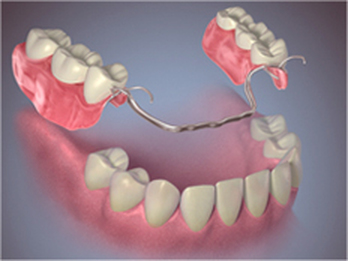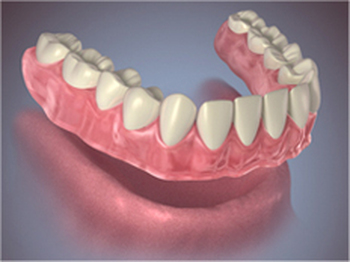Dentures are replacements for missing teeth that are completely removable. While dentures take some getting used to and will never feel exactly the same as one's natural teeth, today's dentures are natural looking and more comfortable than ever before.
|
Partial Dentures
A partial denture rests on a metal framework that attaches to your natural teeth and offers a removable alternative to a bridge. The base of the denture often times includes metal clasps or attachments to help keep it secure.
|
Complete Dentures
|
Getting Used To Your Dentures
New dentures may feel awkward or uncomfortable for the first few weeks or even months. Eating and speaking with dentures might also take a little practice. A bulky or loose feeling is not uncommon while the muscles of your cheeks and tongue learn to hold your dentures in place. Excessive saliva flow, a feeling that the tongue does not have adequate room, and minor irritation or soreness are also not unusual. If you experience any irritation or sore spots, don't hesitate to call our office - Dr. Alexander will get you in as quickly as possible for an adjustment.
Caring For Your Dentures
Over a period of time, your denture will need to be relined, remade, or rebased due to normal wear and tear. Rebasing means making a new base while keeping the existing denture teeth. As you age, your mouth naturally changes. These changes can cause your dentures to loosen, making chewing difficult and irritating your gums. At a minimum, you should see your dentist once a year for a checkup.
Here are tips for caring for your dentures:
Here are tips for caring for your dentures:
- Don't let your dentures dry out. Place them in a denture cleanser soaking solution or in water when you aren't wearing them.
- Brushing your dentures daily will remove food deposits and plaque, and help prevent them from becoming stained. An ultrasonic cleaner at our office can be used to give your dentures a deep clean when you visit for a check-up.
- Be careful when handling your dentures; they are delicate and may break if dropped.
- Never use hot water on your dentures, as this can can cause them to warp.
- Brush your gums, tongue and palate every morning with a toothbrush before you insert your dentures. This will stimulate circulation in your tissues and help remove plaque.
- See your dentist if your dentures break, chip, crack or become loose. Don't be tempted to adjust them yourself — this can damage them beyond repair!


